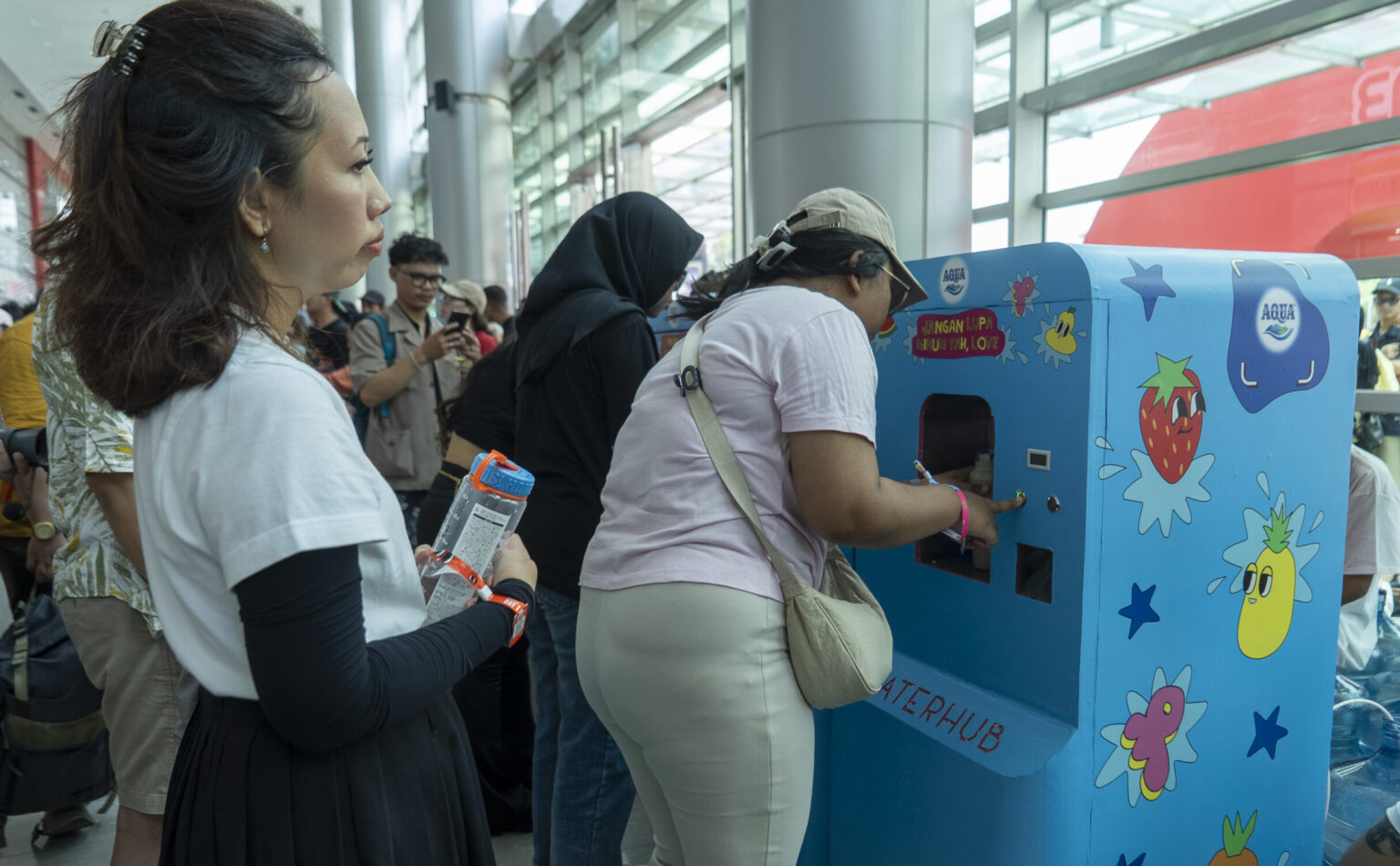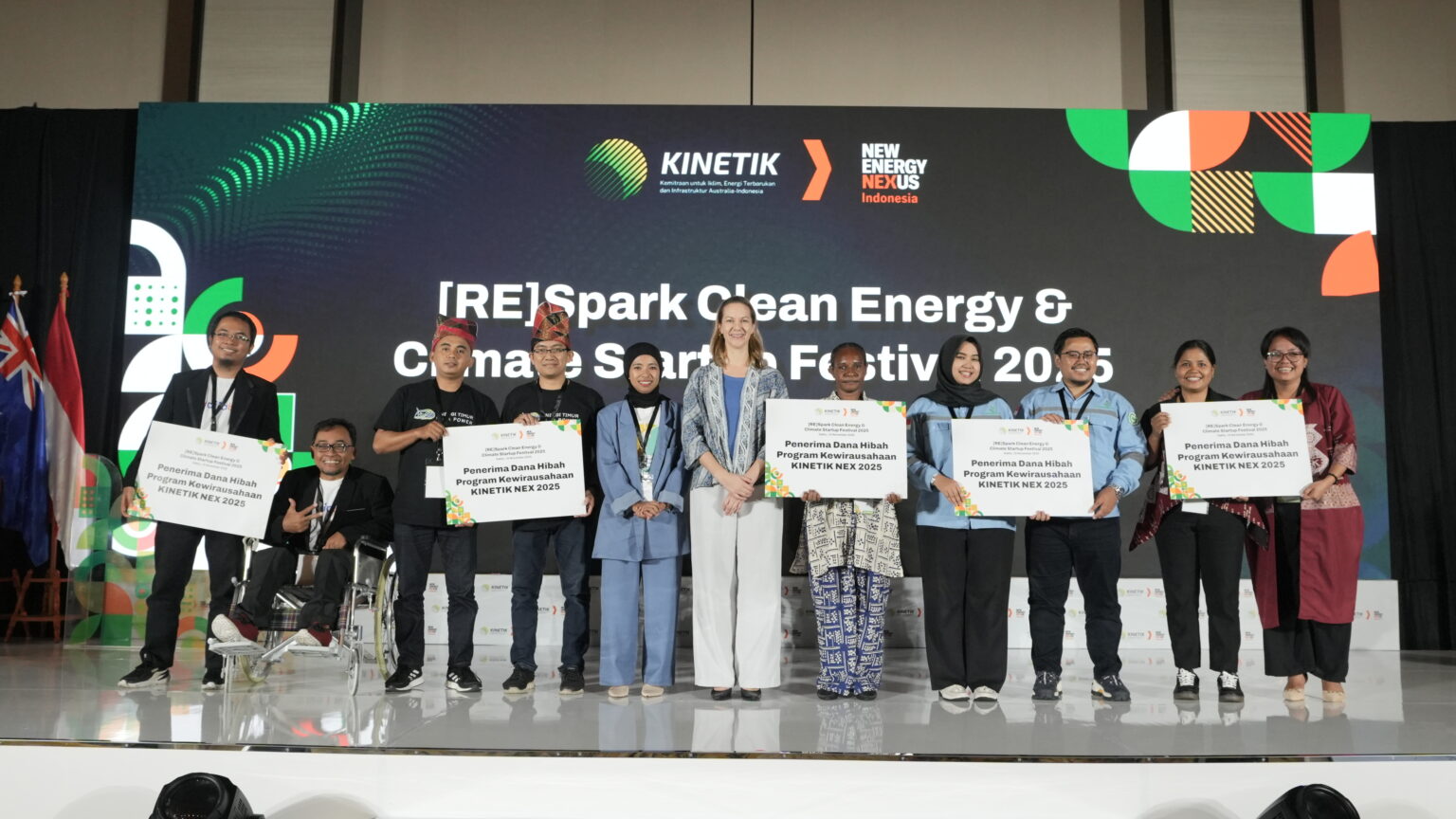
Five Indonesian climate startups have won pilot funding after pitching their solutions to a panel of judges at the [RE]Spark Clean Energy & Climate Startup Festival 2025 in Jakarta.
Fifteen Indonesian climate startups took part in the KINETIK NEX Entrepreneurs’ Program, a business incubation program which supports small and medium-sized enterprises working on clean energy and climate solutions across Indonesia.
Eight finalists were selected from this cohort to pitch their climate solutions at the [RE]Spark Festival.
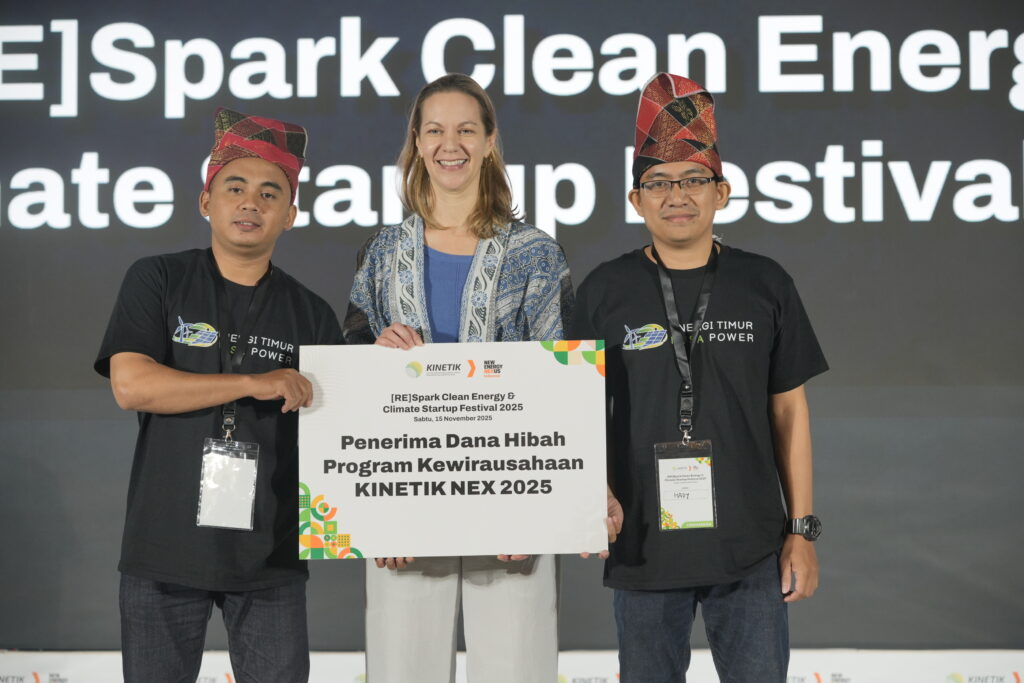
The five winners, who will be awarded funding from a total pool of IDR 1.6 billion to implement their pilot projects, are:
- Difabike – A transport service in Yogyakarta with three-wheeled electric motorbike taxis for people with disabilities.
- Energi Timur Nusa Power – Improves micro-hydro systems to expand rural energy access in Sumbawa.
- GAWIREA – Trains women in South Papua to process sago using solar-powered technology.
- Nusacube – Delivers renewable-energy-powered clean water and ice blocks for fishing communities in eastern Indonesia.
- Sumba Solusi Alam – Distributes solar wells to power lights and recharge phones to off-grid villages in Sumba.
The finalist pitches followed three months of technical support and monitoring.
Jonathan Gilbert, Minister-Counsellor Economic for the Australian Embassy in Jakarta, said Australia was working with Indonesia to expand access to climate finance and accelerate clean-energy innovation through KINETIK, the Australia Indonesia Climate, Renewable Energy and Infrastructure Partnership.
“Climate and energy transitions are not only about technology or policy,” “Minister-Counsellor Gilbert said. “They are about people – how they power their homes, manage their land, and build opportunities for their families.”
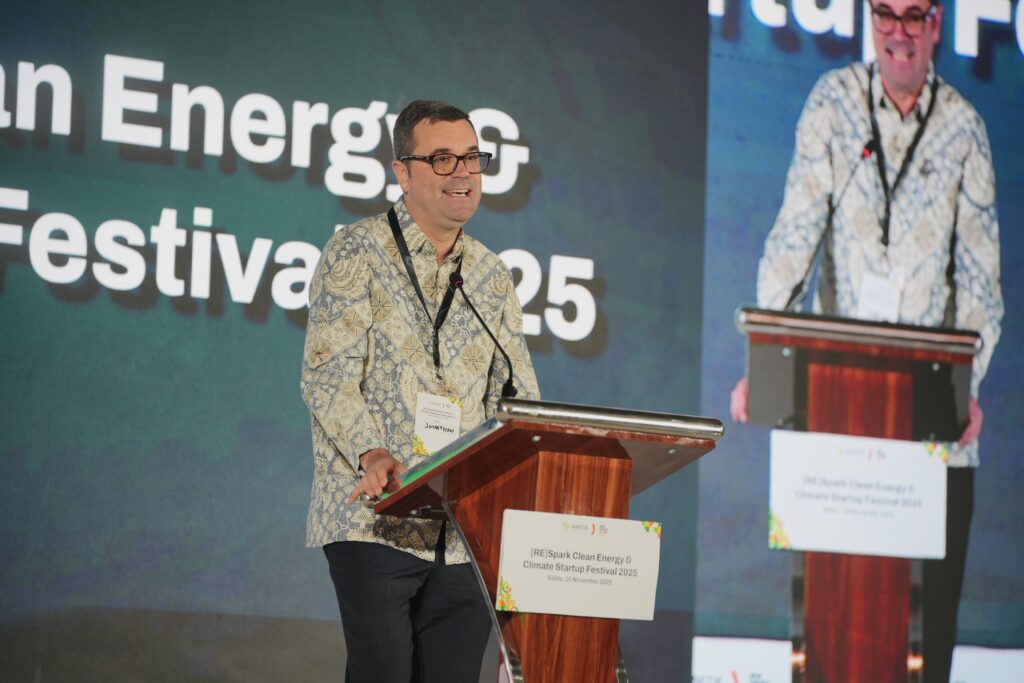
He said Indonesia’s diversity – from the highlands of Papua to the coasts of Sumba and the urban centres of Java – meant there was no single pathway to net zero.
Each community faced different challenges, including access to energy, water scarcity, urban waste, and marine pollution.
“That’s why locally led innovation is so important. When communities design and own their solutions, those solutions last. They reflect local realities, use local resources and create local jobs,” Minister-Counsellor Gilbert said.
“Through [RE]Spark, we are witnessing how local innovators can transform Indonesia’s immense renewable potential into tangible benefits from new jobs and cleaner air to greater energy security.”
Difabike will use the funding to pilot Difabox, a delivery service for large-sized goods at affordable prices, and Difatour, an inclusive tourism service that allows people with disabilities to enjoy Yogyakarta safely and comfortably.
“For us, this win represents progress in our fight for mobility justice, and a chance to educate more people that accessible mobility is essential to everyday life,” said Difabike founder Triyono.

Nusacube will use the grant to roll out its renewable-energy-powered clean water and ice production systems for fishers on Sadulang Besar Island, off the coast of East Java.
“With additional investment from the village and PT Alana Green Electric, we’ll ensure that NUSACUBE operates smoothly and without issues for at least the next five years,” said Dana Saputra from Nusacube.
GAWIREA said it would use the funding to kick-start the development of sand batteries, a low-cost thermal energy storage system that uses heated sand to store renewable energy as heat for later use.
It would then prepare a feasibility study for a pilot in Samurukie in South Papua, where there was a need for renewable energy storage for sago drying.
“For me, this win is a validation that our idea to develop sand batteries as a renewable energy storage solution is both relevant and important,” said GAWIREA founder Andi Rosita Dewi.
“It’s also a morale boost – a reminder that the work my team and I are doing to deliver more affordable clean energy, especially for remote communities, is worthwhile and recognised by … KINETIK and [RE]Spark.”
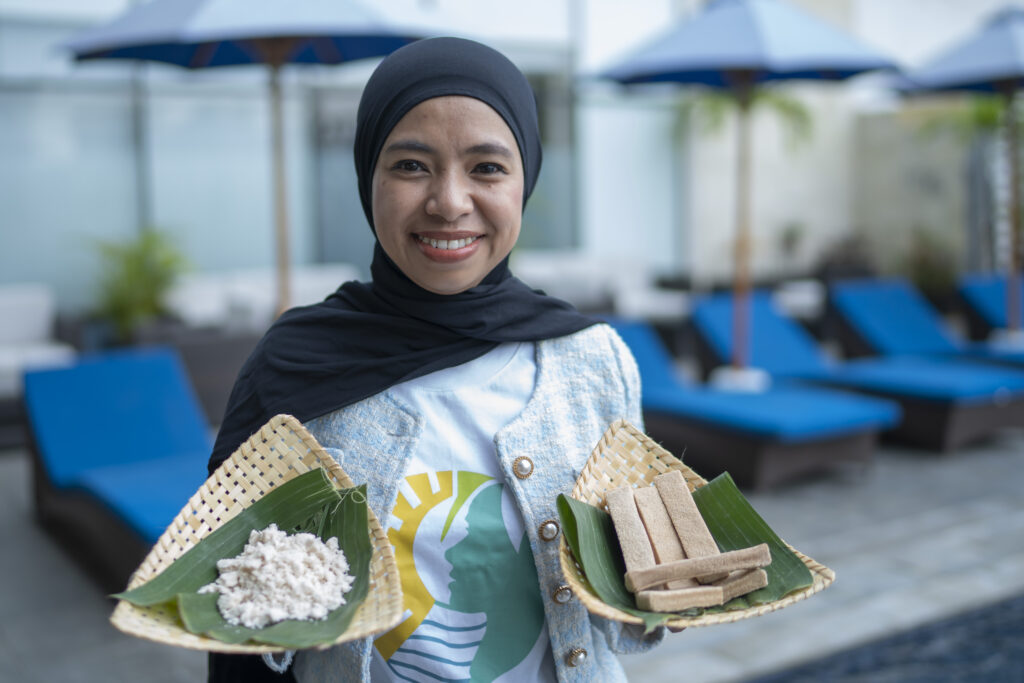
Sumba Solusi Alam will use the grant to expand renewable energy access and bamboo-waste management in East Sumba.
“For us, this win is proof that local innovations can have national impact,” said Jetty Arlenda, the renewable energy coordinator at Sumba Solusi Alam.
Energi Timur Nusa Power will use the grant to run its first pilot aimed at improving the performance of a micro-hydro power plants in Tepal Village in Sumbawa
Many of these plants operate below capacity due to manual systems and limited infrastructure.
Energi Timur Nusa Power will implement a smart control system that automatically adjusts to changes in water flow and electricity demand. This ensures energy supply is more reliable, stable, and efficient.
“The results of this pilot will form the basis for further development, including opportunities to replicate the model in other villages with similar needs,” said Mukhtar Hadi.
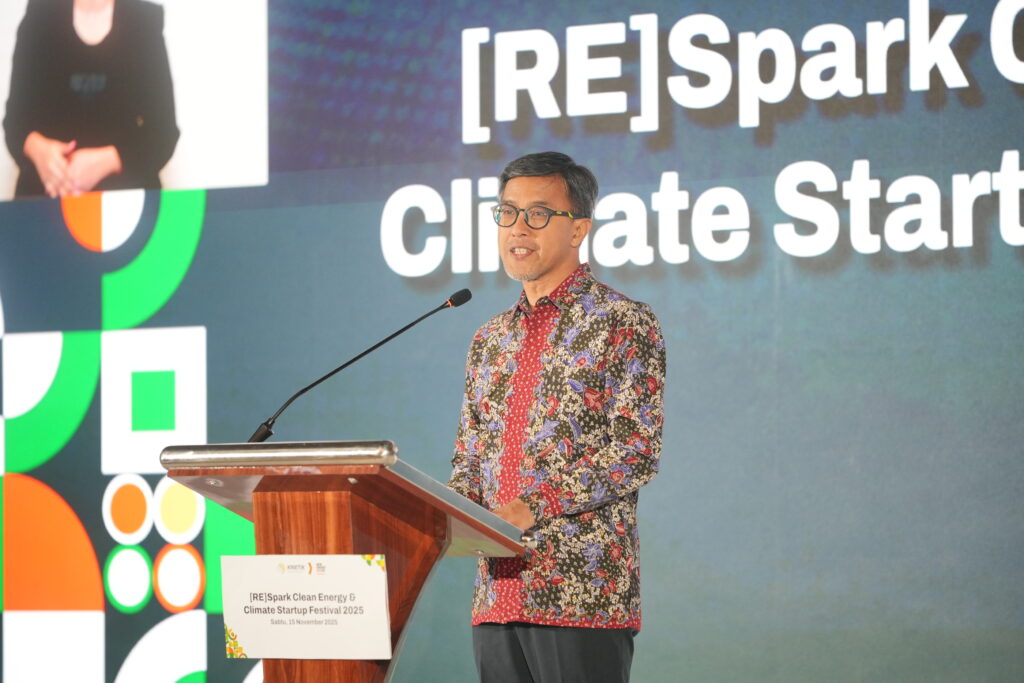
Diyanto Imam, Director of New Energy Nexus Indonesia, said New Energy Nexus was committed to supporting innovators and entrepreneurs across Indonesia.
“We strive to harness local knowledge and combine it with our experience over the past six years to continue supporting the growth and real-world impact of innovators across Indonesia,” Diyanto said.
The [RE]Spark festival, which was attended by 200 people, also featured an exhibition of clean-energy solutions and climate innovation workshops on marine pollution, urban waste, inclusive innovation and water scarcity.

